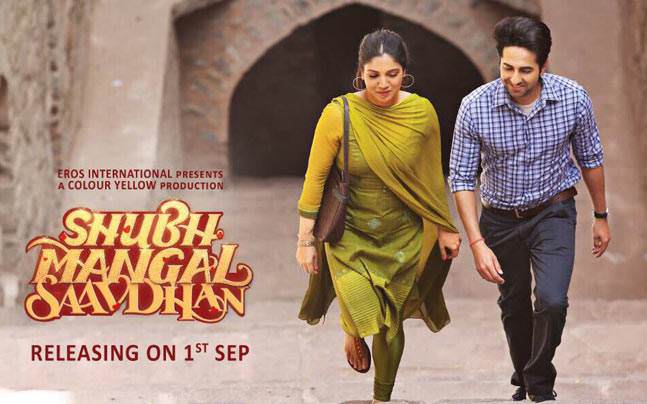Spoilers Ahead
There are many things that Shubh Mangal Savdhan gets right: on feminism, patriarchy and masculinity. From acid attacks to performance anxiety to superstitious beliefs involving marriages to banana plants, and everything in between – the film has it all.
The plot focuses on Mudit and Sugandha’s love story and their wedding, involving two families that try to do everything in their power, sometimes unintentionally, to pry these two apart.The films serves us an appetiser of crunchy satire, a main course of social commentary infused with the essence of irony, and a dessert – a la Bollywood laced with colourful songs and dance, and everything served with a generous sprinkling of witty lines and stellar acting. Even the words ‘patriarchy’ (pronounced “patrarchy” in the film) and ‘masculinity’ are explicitly stated.
It is refreshing to see that parents of prospective brides in small-town India are conspiring to make sure that their children have a satisfactory sex life, though it is still within the ambit of procreation. But nevertheless it is a step in the right direction when mothers take their daughters lingerie shopping before the wedding, though they are still afraid of using correct anatomical terms such as vaginas and prefer the term guffa(cave) instead. A place where fathers warn their daughters that they should run away because they “will not be able to tolerate the taunts of her in-laws”, since the absence of children is always blamed on women. This is a welcome change in mainstream Hindi film.
Also Read: The Evolution Of Bollywood Movie Posters And What They Tell Us About The Society We Live In
Our hero Mudit’s tragi-comic search for a cure for his “gent’s problem” takes him through a bewildering array of sources: quacks promising potions (Bengali babas), a veterinary doctor, internet pornography, well-meaning but ignorant friends who believe an ex-girlfriend will solve the problem, prayers in all places of worship (religion no bar), and finally to biomedical or allopathic medical providers.
Mudit’s search for a cure for erectile dysfunction is actually representative of the average man’s approach to sexual health problems in India. Studies have indicated that usually private, non-allopathic health providers are the first and sometimes the only port of call for male sexual health problems, commonly called Gupt Rog in India. Gupt Rog in Hindi translates to secret disease. It is a secret because of the shame and stigma around sexually transmitted infections (STIs), as well as sexual health problems in India. This is a serious concern since misdiagnosis and an absence of treatment of STIs, puts women’s health at risk since the majority of married women in India contract STIs through their partners.
Given the lack of comprehensive sexuality education or even any form of sexuality education from reliable sources, the film opens up a window of opportunity to discuss sex, as a verb. Yes, there is acknowledgement of pre-marital sex, though there is enough parental disapproval of it to make it clear that it is being tolerated and not accepted.
Mudit’s search to cure erectile dysfunction represents the average Indian man’s approach to sexual health problems.
In fact during a showdown with the elders in the family, Mudit makes it clear that it is his problem, not hers. There are some very clap-worthy lines on masculinity, and that masculinity is not only defined by sexual performance. Mudit’s castigation of his father who embodies all that we have come to associate with toxic masculinity (abuse of alcohol, obsession with Sunny Leone and refusal to admit that his son could have a problem) is an extremely important moment in the film.
Mudit’s reflections on his erectile dysfunction stemming from anxiety (though what he is so deeply anxious about, is never made completely clear to the audience) and Sugandha’s unstinting support for him, so long as she is sure he is making an effort to remedy it, makes for a heart-warming and realistic love story. It must be emphasised that Sugandha does not ease up on her expectations of him, though she is very pragmatic about what marriage (and children) will do to the relationship. This is a strong female protagonist who is explicit in her demands and makes no apologies for it.
So is this a feminist film? For the most part, yes. The only shortcoming is the caricatured portrayal of the ex-girlfriend as a wily seductress. She may have been necessary in the penultimate scene in the film, but a woman who is overtly sexual who is still pining for her lost lover, should not be a source of comic relief. Least of all, in a film that is by all other measures progressive.
Also Read: Film Review: Parched, Of Women Thirsting For More
Featured Image Credit: India Today
About the author(s)
Sreeparna Chattopadhyay has a Ph.D. in Cultural Anthropology from Brown University with research interests in gender and its intersections with health, education family and the law. She is an independent researcher.





Both the movie & the review are awesome!